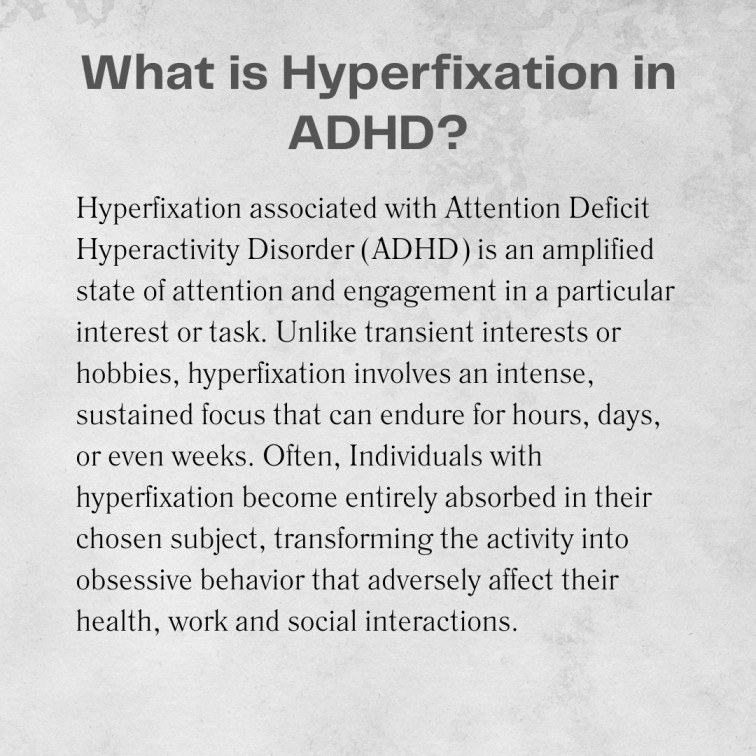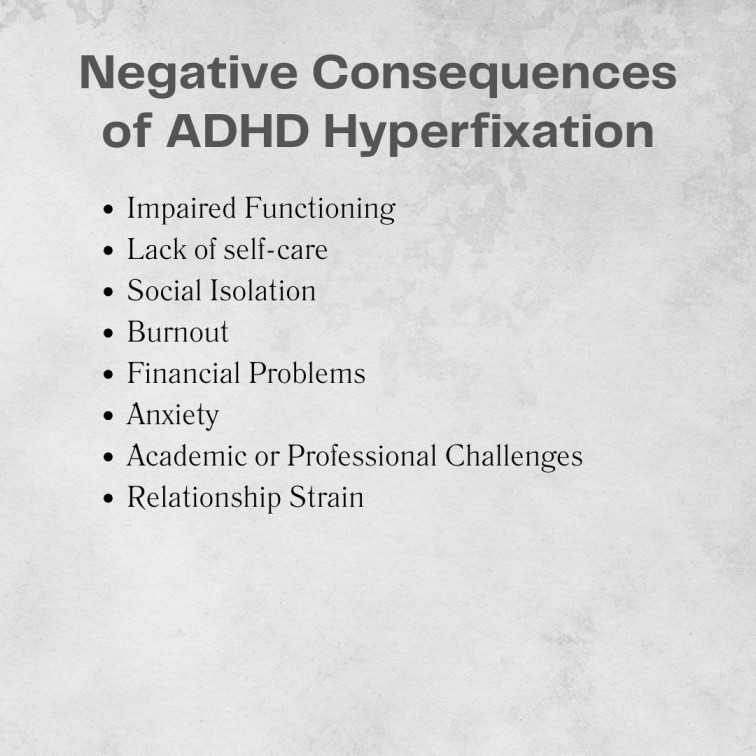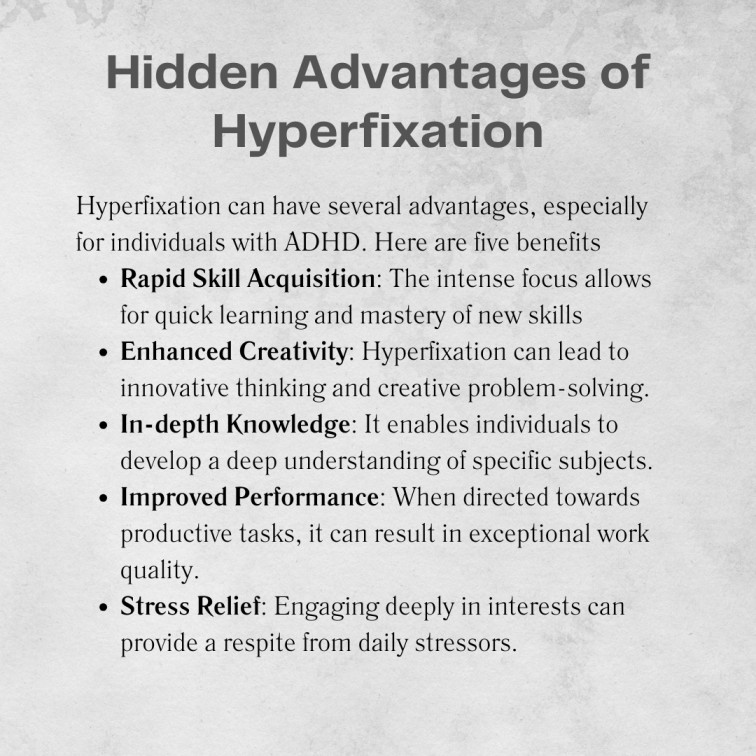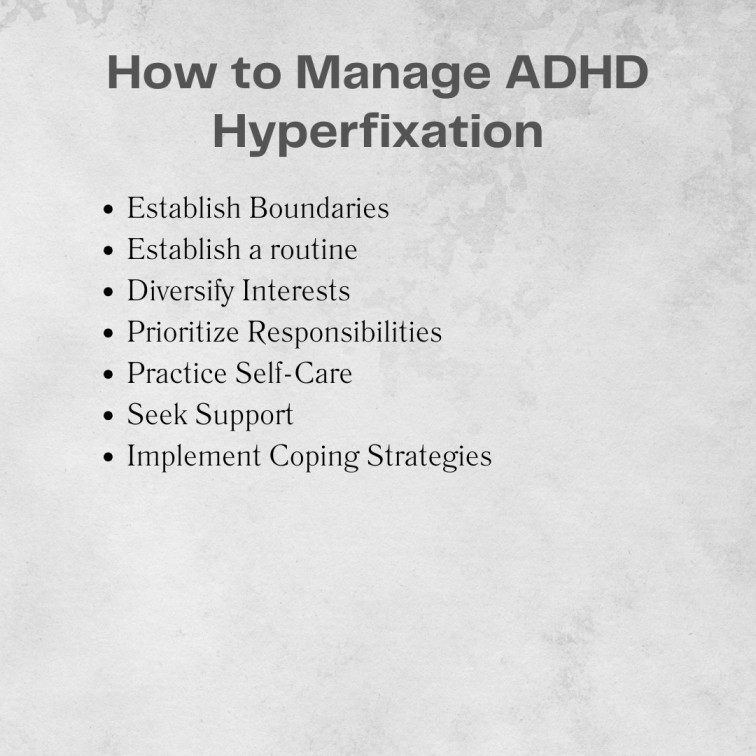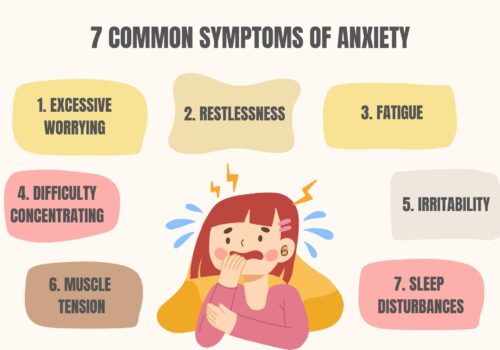ADHD hyperfixation is a compulsive tendency to focus on a particular subject, activity, or task, often to the exclusion of all else. It is one of the lesser symptoms of ADHD (Attention Deficit Hyperactivity Disorder), a neurodevelopmental disorder characterized by persistent patterns of inattention, impulsivity, and hyperactivity. While ADHD could prove productive due to commitment to a task, it can also pose a problem, leading to gross neglect of other responsibilities in life.
What is Hyperfixation in ADHD?
Hyperfixation associated with Attention Deficit Hyperactivity Disorder (ADHD) is an amplified state of attention and engagement in a particular interest or task. Unlike transient interests or hobbies, hyperfixation involves an intense, sustained focus that can endure for hours, days, or even weeks. Often, individuals with ADHD may experience hyperfixation to such a degree that they lose track of time, spending hours on something that might not justify the mental investment.
Individuals with hyperfixation become entirely absorbed in their chosen subject, transforming the activity into obsessive behavior that adversely affect their health, work and social interactions. Some manifestations of ADHD fixation include:
- Immersive Engagement: Individuals are immersed in their interests, losing track of time and surroundings.
- Single-minded Focus: Individuals can concentrate solely on their chosen activity, neglecting responsibilities or commitments.
- Intense Passion: Individuals with hyperfixation display profound enthusiasm and passion for the subject, devoting their entire time and energy to it.
- Forgetfulness: Individuals must remember about commitments such as health, social or professional appointments and deadlines.
- No sense of time: Hyperfixated individuals lose all sense of planning, time management and prioritizing.
Difference Between ADHD Hyperfixation And Sustained Focus
ADHD hyper fixation should not be confused with committed and sustained focus. For example, an efficient project manager focused on a task will resemble hyperfocus as they spend hours completing it. However, in doing so, they will remember to take care of their individual needs, hygiene, and additional responsibilities. In contrast, an individual with hyperfixation will forget responsibilities, skip meals, delay going to the bathroom, and possibly even not sleep. In extreme cases, they will also lose track of all social and family life. While hyperfixation can be beneficial in helping individuals expand their knowledge, it is counterproductive due to the neglect of work obligations, relationships, self-care, and its impact on mental stability.
Examples of ADHD Hyperfixation
ADHD hyperfixation usually centers around topics that most attract an individual with ADHD. In children, activities could make them happy, whereas in adults, it could be a hobby. It is the activity that becomes the fixation. Some common examples are:
- Endless hours of gaming
- Binge-watching documentaries or reading
- Obsessing over a TV series and being completely engrossed in fandom, characters, etc
- Obsession over an instrument, music
- Obsession over a hobby
- Obsession over a sport or athletic activity
- Obsessions on special interest topics like astronomy
What Causes Hyperfixation in ADHD?
Experts have yet to figure out what causes ADHD hyperfixation, but most think it is due to ADHD neurobiology. Some of the factors driving ADHD Hyperfixation could be:
Executive Dysfunction: Individuals with ADHD often struggle with executive function, with an inability for planning, organization, and impulse control. They need to maintain an understanding of priorities against and regulate attention. Hyperfixation could be a coping mechanism to manage and provide a structured outlet for their energy and creativity. Moreover, the emotional stimulation from the hyperfixed activity restricts the ability to focus on other tasks.
Dopamine Dysregulation: ADHD is associated with dysregulation of dopamine, a neurotransmitter involved in motivation, reward, and attention. Hyperfixation could be a reward mechanism to boost dopamine levels and enhance focus.
Sensory and Stimulatory Seeking Behavior: Some individuals with ADHD engage in sensory-seeking behaviour, actively seeking out experiences for sensory stimulation to alleviate boredom or restlessness.
Negative Consequences of ADHD Hyperfixation
While ADHD hyperfixation can offer a sense of purpose and fulfilment, it also poses challenges and disruptions to daily life. Obsessing one task without attending to others can lead to several problems, including the inability to pay attention to one’s needs. Hyperfixation can run into hours, which means a severe impact on health and social life, forcing people with the condition to fail in their relationships, social, professional, and parental obligations. Other ways ADHD fixation can impact people’s lives include:
- Impaired Functioning: Excessive fixation on a single activity can interfere with other aspects of life, including work and relationships. Individuals may neglect essential tasks or obligations in favor of their fixation, leading to problems at school, work, or home.
- Lack of self-care: Individuals with ADHD hyperfixation tend to neglect their own needs, fail to sleep, resort to poor eating habits, and neglect hygiene. This can also impair health, causing weight gain, muscle loss, and poor immunity.
- Social Isolation: An intense preoccupation with a specific interest may lead to social withdrawal, isolation or alienation from peers who do not share the same passion. This can cause loneliness and depression.
- Burnout: Hyperfixation can be mentally and physically exhausting, mainly when pursued to the point of neglecting rest. The impending result is burnout, leading to fatigue, stress, and a decreased interest in the activity over time.
- Financial Problems: Hyperfixation can lead to impulsive spending on resources related to the hyperfixation, resulting in accumulated financial difficulties and debt.
- Anxiety: When a person cannot come out of the spell of hyperfixation, it often leads to mental distress and hyperfixation anxiety. This impairs daily functioning and can be related to underlying mental disorders such as GAD (general anxiety disorder) or OCD (obsessive compulsive disorder).
How to Manage ADHD Hyperfixation
While hyper fixation can be challenging to manage, there are strategies that individuals with ADHD can employ to harness its potential while minimizing its negative impact.
Establish Boundaries, Set Alarms
Try to establish boundaries and exert some control over hyperfixation by preventing it from consuming every aspect of life. Use timers or alarms to signal when it’s time to take breaks and attend to other responsibilities.
Establish a routine
A well-structured routine with other tasks and responsibilities can help regain balance and control. While allotting time for the hyperfixated activity, spend some time on other tasks too.
Diversify Interests
Encourage exploration of new hobbies and interests to prevent hyperfixation from becoming overly narrow or restrictive. Engaging in a variety of activities can promote balance and avoid burnout.
Prioritize Responsibilities and Time Management
Practice time management skills and establish priorities to address all necessary tasks and obligations before indulging in hyperfixation. Create to-do lists to organize daily activities and maintain a sense of accountability.
Practice Self-Care
Make self-care a priority by including relaxation, stress management, and activities that promote well-being. Engage in exercise or hobbies unrelated to hyperfixation to maintain balance.
- Try relaxation activities such as mindfulness meditation
- Meditation for ADHD
- Deep breathing to help regulate attention.
Seek Support
Contact friends, family members, or mental health professionals for support and guidance in managing hyperfixation. Therapy, support groups, and online communities can provide valuable resources and insights from others with similar experiences. ADHD hyperfixation can be addressed by therapy techniques such as CBT for ADHD to ensure an improved quality of life.
ADHD hyperfixation is one such phenomenon that genuinely reflects the complex psychology of ADHD. While hyperfixation can be both a source of passion and frustration, understanding its nature and impact is essential for developing effective coping strategies and achieving a balanced approach to life. Adopting the suggestions outlined here can help hyper-fixated individuals navigate the complications and challenges resulting from the condition for fulfilment and mental well-being.
Frequently Asked Question
ADHD Hyperfixation: Is it productive focus, or just obsessive behavior?
Hyperfixation can swing both ways. When channeled effectively, it can lead to productive focus. However, if left unchecked, it may transform into obsessive behavior. The key lies in striking a balance between intense interest and other life responsibilities.
Can individuals harness the superfocus of hyperfixation to their advantage?
By directing their intense concentration toward productive tasks, hyperfixated individuals can leverage their superfocus however Setting boundaries and being mindful of other responsibilities are crucial.
Can ADHD hyperfixation be managed or controlled?
Yes, it can. Strategies include:
- Time Limits: Setting time constraints on hyperfixated activities.
- Reminders: Using reminders for other tasks.
- Professional Help: Seeking guidance if needed.



